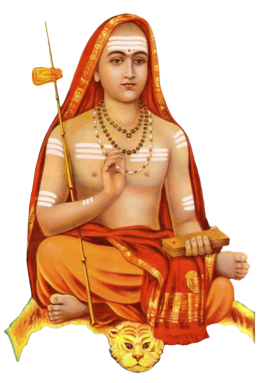मुखत्वात् पृथक्त्वेन नैवास्ति वस्तु ।
चिदाभासको धीषु जीवोऽपि तद्वत्
स नित्योपलब्धिस्वरूपोऽहमात्मा ॥३॥
mukhatvāt pṛthaktvena naivāsti vastu .
cidābhāsako dhīṣu jīvo’pi tadvat
sa nityopalabdhisvarūpo’hamātmā .. 3..
English Translation and Notes based on the Bhashya of Sri Sankara
Translated by S. N. Sastri
When one face is reflected in a number of mirrors the reflections may be of different shapes and sizes, according as the mirror is plain or convex or concave. The reflection in a particular mirror shakes if that mirror shakes. The reflection is hazy if the mirror is not clean. But all these differences in the various reflections do not at all affect the face that is reflected. In the same manner the Jivas or the individual souls which are only reflections of the same Self in different minds have different characteristics, depending on the nature of each mind, but the Self which is the original does not at all take on the characteristics of the minds, but remains ever the same. The Jiva, who is also in reality Pure Consciousness and therefore eternal and infinite, wrongly identifies himself with the particular mind in which he is reflected and with the physical body associated with that mind. Consequently, he looks upon himself as a limited individual and attributes to himself the joys and sorrows, hunger and thirst and old age and death, which all pertain only to the body and mind. The aim of all the Upanishads is to remove this wrong identification.
Now another doubt arises. If the Atma is not affected by what happens to the body, mind, etc, then it means that there is no bondage at all. If so, what is the need for the Upanishads teaching about the means of removal of bondage? This doubt is answered in the next verse.
Hastamalakiyam – Verse 3 – Hastamalaka-3-mukhābhāsako – In Sanskrit with English Transliteration, Translation, Meaning and Bhashya – Commentary by Sankaracharya – Hastamalakiyam-3

